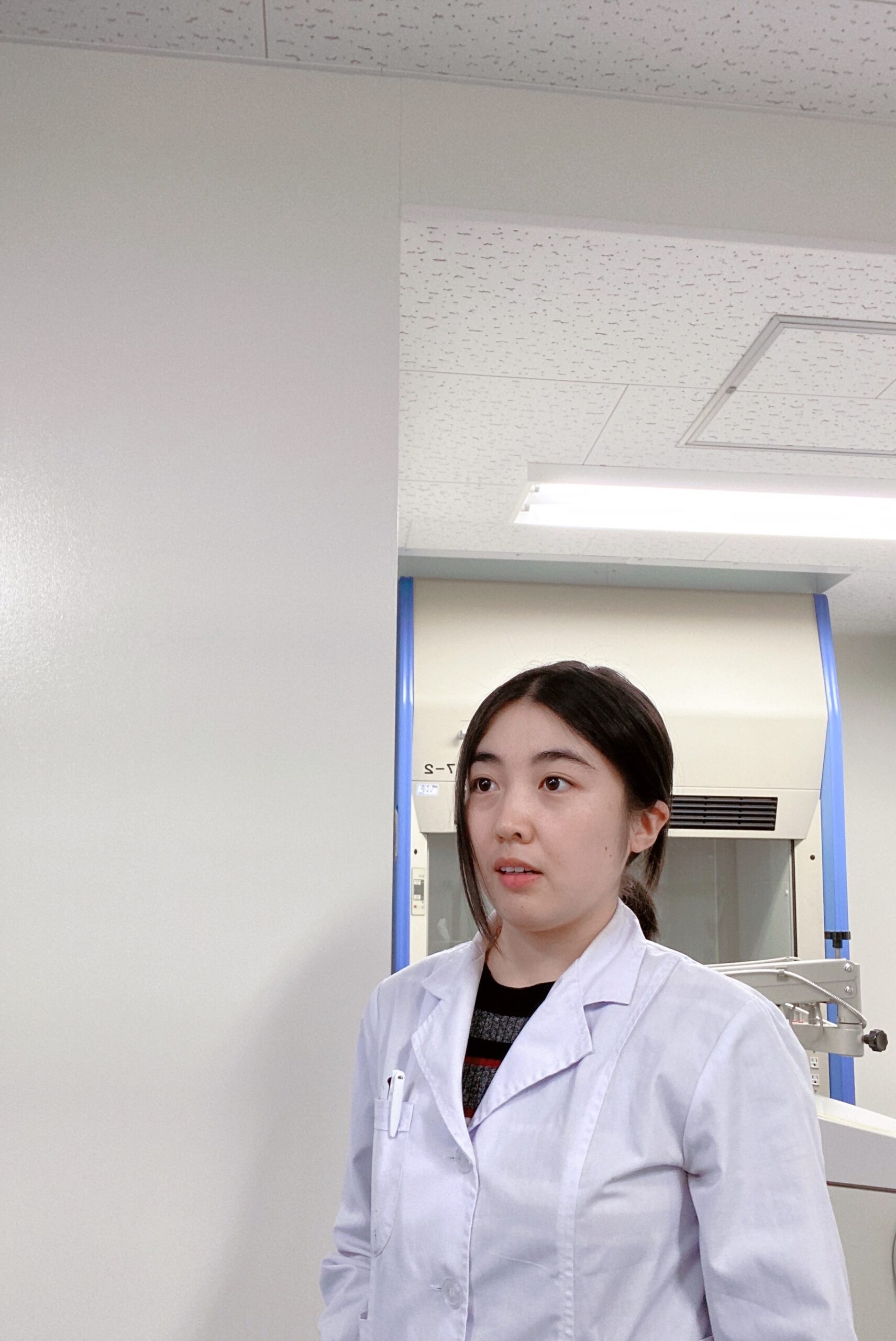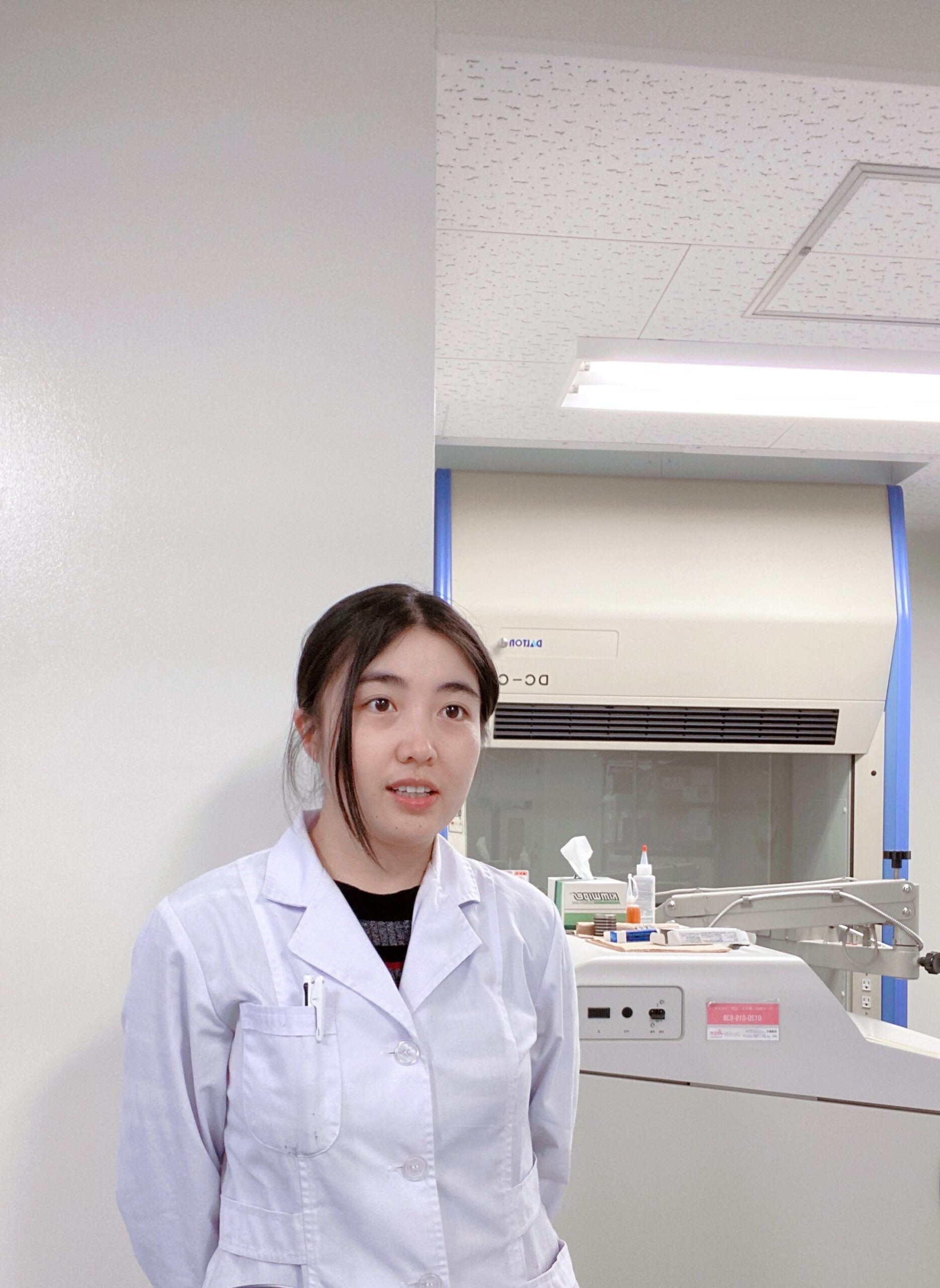I hope to become a bridge for academic exchanges of ophthalmology.

How did you know our Graduate School? And what kind of research do you conduct now?
In 2018, I decided to study abroad before graduating from college. Then, I contacted my current academic advisor, Toshihiko Matsuo. Then, I was known about the Graduate School of Integrated Health Systems, Okayama University for the first time from my teacher.
The current research is analyzing gene related to strabismus. Strabismus is the displacement of both eyes and refers to the inability of both eyes to focus on the same image at the same time, resulting in crossed eyes or weak eye and so on.
Our previous study identified the MGST2 was shown to be potential candidate gene for comitant strabismus in Japanese families, including esotropia and exotropia. Therefore, we have been established MGST2 gene knockout mouse model to further confirm MGST2 gene is related to strabismus or not, to search for the role of MGST2 gene in strabismus, and to observe any structural anomalies in all organs and tissue.
The research method mainly uses MRI to see the differences in brain, eye size, pupil diameter, extraocular muscles of wild type and homozygous mouse. Also, to detect mRNA expression levels in all organs and tissues. We hope this study can bring a new breakthrough point and new treatment way to strabismus disease.
Why did you decide to study at our Graduate School?
When I was an undergraduate student, I became more interested in surgery than in internal medicine through a year of practical training at the Inner Mongolia National University Hospital. Among them, ophthalmology is my strongest subject, and I have set the goal of becoming an ophthalmologist or ophthalmology researcher in the future. At that time, I thought that undergraduate education and knowledge was not enough to start my career. I need more learn professional knowledge. Therefore, I decided to go on to graduate school to increase my knowledge. Studying abroad may be better option for me.
Japan is a country that great focus on education, the medical technology even is first-class in the word. That was why I chose to study in Japan. In the process of searching for Japan University, I was very interested in the study of “Artificial Retina” and ” Strabismus Gene” by Professor Toshihiko. These studies amazing for me, that are top academic studies in ophthalmology, it would be a great pleasure if I could be a part of this team.
Then, I contacted the teacher and came to Japan to take part in entrance exam. Finally, I passed exam and then entered the Graduate School of Integrated Health Systems, Okayama University. This is my beginning to pursue my dream.
What was the most memorable, happy, or enjoyable thing that happened to you in Japan (after you came to Okayama, on campus, etc.)? And, please tell us if there are any experiences you would like to try or places you would like to visit in Japan during your stay.
After coming to Okayama, the happiest thing is to take inserting flowers class with foreign friends in Japanese class. This was my first time taking an ikebana class, and a Japanese teacher taught me carefully about ikebana. I chose a flower I liked, inserted it as instructed. Finally, beautiful product was done. This was my first experience with traditional Japanese culture, left a deep impression on me.
It was interesting that interacting with international students from different countries can help you know different worldviews and values. It also a good opportunity to make many friends.
In addition, the most desired experience in the future is to climb to the top of Mount Fuji. I want to climb the highest mountain in Japan and challenge myself.

What is the appeal of your campus life?
The campus life is colorful, and the campus scenery is very beautiful. Currently, I am learning various experimental methods and analysis methods under the guidance of the teachers around me to advance my research subject well.
Except for research and studies, I like to learn languages. I will go to the L-café on campus to interact with international students to learn English, German, and Italian, and communicate with Japanese students to learn Japanese. Fortunately, last year I got Japanese N2 through work hard. I also participated in the English TOEIC test in February of this year. I will also go to various activities held by L-cafe, such as inserting flowers, orange picking, strawberry picking, and activities to experience traditional Japanese festivals. These let me know Japanese culture.
As mentioned above, in my campus life, these have been very helpful to my growth, and it is also a wonderful memory.
How do you think about your future career path?
My research life began with my study abroad life in Japan. This is because Japan’s medical research is at the forefront of the world, with access to the world’s best research environment and the latest research information. The current supervisor, Professor Toshihiko Matsuo (Professor of the Department of Integrated Science of Health System, Okayama University, Ophthalmologist at Okayama University Hospital), is advancing the latest ophthalmic technology in his research on “Artificial Retina” and “Strabismus Gene”. With the support and leadership of my professors, I think I will gain deep knowledge and skills, and then become a full-fledged researcher.
After graduation of doctor degree, I hope to continue working as a researcher at Okayama University to continue researching eye diseases. It also hopes to become a bridge for academic exchanges of ophthalmology between Japan and China, and more countries in the field of vision.
I will work harder for my dream and future.
Please give a message to those who are thinking of studying at our Graduate School.
Nowadays, as the world population ages rapidly and sustainably, these faces many challenges. People worldwide are living longer. Today most people can expect to live into their sixties and beyond. Every country in the world is experiencing growth in the proportion of older persons in the population. At the biological level, ageing results from the impact of the accumulation of a wide variety of molecular and cellular damage over time. This leads to a gradual decrease in physical and mental capacity, a growing risk of disease and ultimately death.
We need to consider how to think about the various parts, and factors of the synthesis problem. This graduate school is a comprehensive graduate school. Professional fields include medicine, health sciences, engineering, bio-technology and sociology. When you are studying major area, also learn about theories and methods in other majors in Graduate School of Integrated Health System, and then combine them to understand, to study and to solve many subjects in society. If you interested its, Welcome to Okayama University Graduate School of Integrated Health System.
